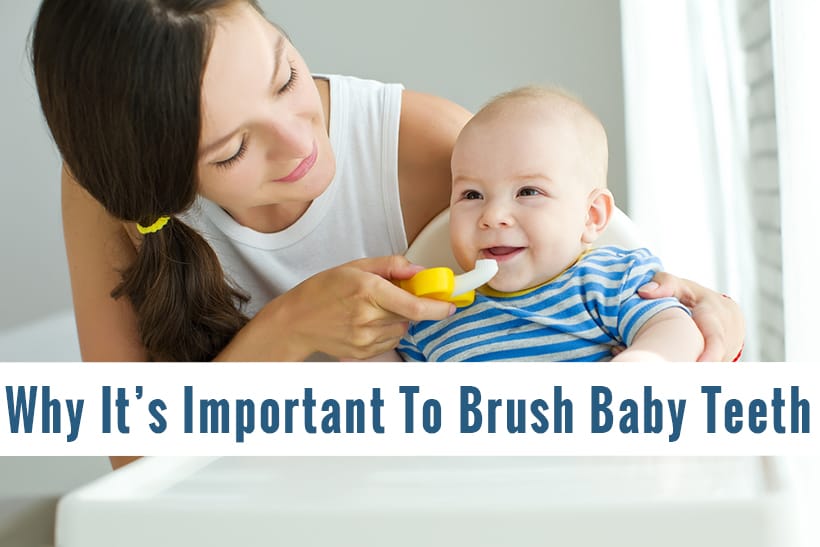
Babies aren’t born with teeth, but that toothless grin doesn’t last for long. Most babies get their first tooth between the ages of 3 months and 12 months. By the age of 3, most children have all 20 primary teeth present in their mouth. It is imperative to be caring for these teeth, and it’s even recommended to do so before they erupt.
Caring for a baby is a lot of work! It may feel overwhelming to think about caring for your little one’s teeth and adding yet another routine to your baby’s schedule. Your dentist wants you to know that taking the time to brush your baby’s teeth will have lifelong benefits.
Why Is It Important To Brush My Baby’s Teeth?
Baby teeth must be brushed and cared for well because they are susceptible to cavities and infections just like our adult teeth can. If a baby tooth gets a cavity, a filling can usually be done, but most of us probably agree that preventing decay for a 3-year-old would be best.
Baby teeth also help to hold the space for our adult teeth. The concern with not brushing the baby’s teeth is that it could lead to an infection or tooth loss if it gets decay. If a baby tooth is lost too soon and the adult tooth isn’t ready to erupt, the other surrounding teeth may start shifting around and crowd out the adult tooth. This can create challenges with eating, speech and also create real crowding problems down the road.
When Should I Start Brushing My Baby’s Teeth?
It’s never too soon to be cleaning your baby’s mouth. Since your baby doesn’t have teeth for the first few months of their birth, you can pay special attention to care for their gum tissue. Even before their first tooth erupts, bacteria can be present.
Since bacteria feed on sugar, they can often colonize from breastmilk or formula. It can be beneficial to gently rub the gum tissue with a soft, moist cloth. The cloth is enough to remove the sugars from sitting on their gums. It is also essential to avoid letting your baby fall asleep with milk or juice. These sugars can sit on the gums and eventually the teeth, which can cause problems with decay.
Once your baby’s first tooth erupts through the gum tissue, you will want to continue wiping it off with a cloth, as this is enough to disrupt even stubborn plaque. Once the tooth has erupted all the way, it is an excellent time to introduce your baby to a toothbrush, and you can gently brush the tooth for them.
It is recommended that you schedule your baby’s first dental visit when they are one year old or six months after their first tooth erupted. This can be a great time to speak with a dental professional about your baby’s teeth and any concerns that you have.
How Do I Brush My Baby’s Teeth?
When you brush your baby’s teeth, you will want to use a soft-bristled toothbrush with a small head. Many dental supply companies make small toothbrushes specially sized for babies.
When brushing your baby’s teeth, lay him or her on their back with their head in your lap. This allows you the best view to take a close look at the teeth and have the best angle for brushing. It also allows you to have the toothbrush in one hand, and your other hand is free to help move their lip or open their mouth. Very light brushing twice a day will be enough to remove plaque from your baby’s teeth and also their gums.
You might have times that your baby doesn’t want their teeth brushed. This is normal, and it’s best to keep the routine going because it will help build healthy long-term habits. Even something as simple as singing them a song while brushing their teeth may help make the process go more smoothly.
Should I Use Toothpaste To Brush My Baby’s Teeth?
Toothpaste is unnecessary for brushing babies’ teeth. Water and a toothbrush are all that is needed to keep your baby’s teeth healthy and plaque-free. As you find that they are getting several more teeth, you can introduce them to a training toothpaste. A training toothpaste is one specially formulated for young brushers, and it does not contain fluoride. Never use a toothpaste containing fluoride on your baby’s teeth, as fluoride can pose health problems when swallowed.



Leave a Reply